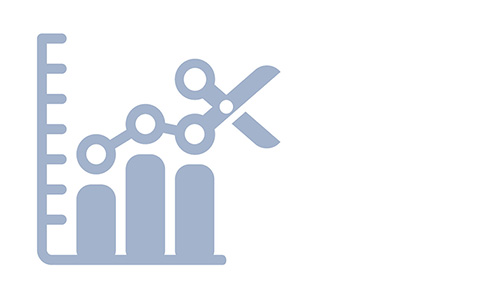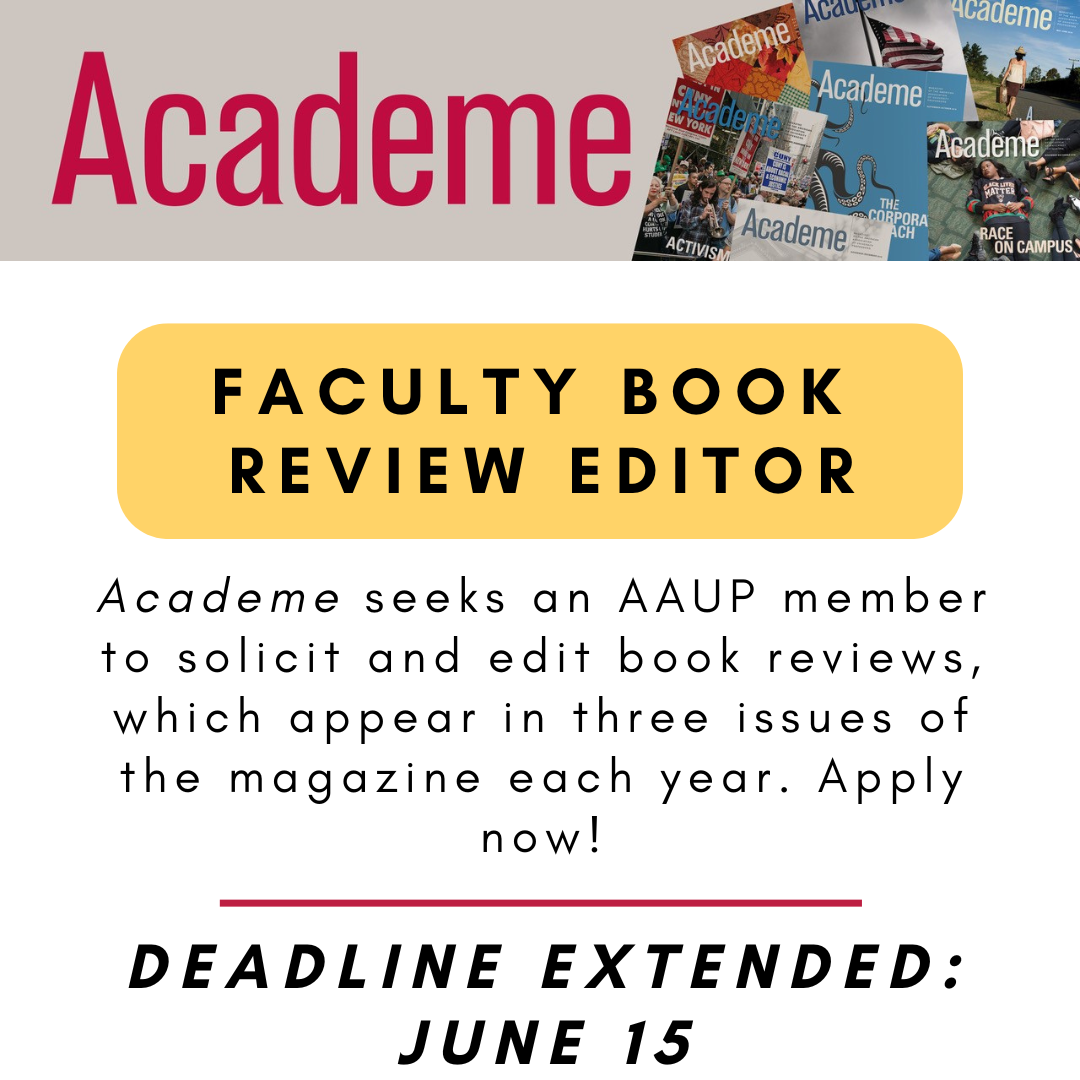- About
- Programs
- Issues
- Academic Freedom
- Political Attacks on Higher Education
- Resources on Collective Bargaining
- Shared Governance
- Campus Protests
- Faculty Compensation
- Racial Justice
- Diversity in Higher Ed
- Financial Crisis
- Privatization and OPMs
- Contingent Faculty Positions
- Tenure
- Workplace Issues
- Gender and Sexuality in Higher Ed
- Targeted Harassment
- Intellectual Property & Copyright
- Civility
- The Family and Medical Leave Act
- Pregnancy in the Academy
- Publications
- Data
- News
- Membership
- Chapters
Data Sources, Funders, and Austerity in Higher Education
How economic interests shape data-driven higher education.

Data have become integral to the culture of higher education. We’re told to go where the data lead and that all decisions must be data-driven, as if all data are inherently objective. Reliance on data is a fundamental component of the austerity agenda as well. Preparing for Tough Conversations, a report published in 2019 by the Chronicle of Higher Education, makes this approach clear, as it advises higher education administrators to “use data to establish and define the problem.” “Empirical evidence,” writes Lee Gardner, the report’s author, “is the best counter to suspicions of administrative overreach.”
Recently, the Chronicle of Higher Education again framed the current discussion about the value of higher education in terms of data. In an introductory essay, “Higher Ed’s Public Perception Problem,” editor Brock Read described “two stories,” both supported by “plenty of data.” One story is that “higher education is as valuable as it has ever been,” a “pathway to financial stability and a longer, healthier life.” Presumably, the data to which Read is referring consist of wage and wealth comparisons between individuals in occupations that require a higher education and those in occupations that do not, as well as data showing that those with a higher education tend to live longer than those with less formal education.
Read went on to describe another story, “supported by plenty of data, too. . . . Confidence and trust in higher ed are fast eroding. Whatever good colleges and universities may do for individuals, communities, and the country, much of the public isn’t convinced of it.” These data consist of public opinion surveys—perceptions—about which outlets like the Chronicle of Higher Education report regularly.
Education and economic data provided by government agencies shed considerable light on the public’s declining confidence in higher education. For example, data from government agencies show that we now have the most educated population in American history yet a labor market still dominated by low-education, low-wage jobs, leading to high rates of underemployment among holders of bachelor’s and advanced degrees. Official data in inflation-adjusted dollars also illustrate that the wages and salaries of many working in jobs requiring bachelor’s and advanced degrees, in fields like education and social services and at nonprofits as well as in many entry-level business positions, have stagnated for decades.
Finally, official data from state governments reveal the long-term disinvestment in public colleges and universities—where more than 70 percent of students are enrolled—that has made public higher education far more expensive, thereby substantially shaping the student loan crisis. But because nearly all the data in higher education policy discussions originate in research funded by foundations and corporations, data from federal and state agencies are rarely found in mainstream debate.
Conceptualizing Data
As scholars, we know that data sources matter and that all data are not created equal. The academy has long wrestled with difficult questions regarding how funding sources shape research questions, findings, and interpretation. The voluminous scholarly work on conflicts of interest in health care and medicine, for example, has led to major public policies, such as the Open Payments database that was established through the Affordable Care Act, in which citizens can view the financial relationships between their medical providers and drug and medical device companies.
In higher education policy, however, simply invoking the word data and presenting any numbers implies total objectivity, and questions about data sources, conflicts of interest, and the policy preferences of the funders of data are too often considered out of bounds. Thus, higher education has not yet begun to adequately consider the implications of an information ecosystem in which almost all data are produced or funded by corporate interests and foundations.
Yet it is these very interests that are the primary architects and beneficiaries of a neoliberal economic order that has intentionally framed economic opportunity and the mitigation of inequality solely in terms of education and training. This framing deflects attention away from the more proximate influences on growing inequality and stagnant wages rooted in public policies and business culture.
Ultimately, higher education’s use of data is much more about advancing the interests of corporations and the wealthy, including through austerity, than about creating policy in the interests of students and the public. And understanding higher education’s facile conceptualization of data begins with an analysis of the evolution of the word data.
In 1954, the first edition of the influential volume How to Lie with Statistics, by Darrel Huff, was published. The book sold quite well, and according to Wikipedia, by the 1960s and 1970s had become a common text in college-level statistics classes. As a result, by the 1980s, the word statistics had developed a mixed reputation. The notion that one could distort or misuse numbers in furtherance of a predetermined political agenda effectively became common knowledge, and the word statistics thus lost credibility, even as quantitative measurement became more ubiquitous in social life.
As neoliberalism took hold in the 1980s, the supremacy of quantitative measurement, led by business interests and taught in business schools, intensified, necessitating a change in our language. Because of its bad reputation, the word statistics would no longer suffice. The term had become squishy, too subjective. So, business and education reformers began to invoke the term data in place of statistics. Data—unlike statistics—were thought to be objective, and this connotation continues to this day, as evidenced by the term’s common usage and understanding in both business and higher education.
The Fantasy Economy
This simplistic understanding of data has led to higher education’s unwillingness to carefully consider data sources. Nearly all the foundations and business interests that fund the data in mainstream higher education have explicitly stated education policy agendas, all of which are grounded in human capital theory, which assumes an exclusive linkage between economic opportunity and education or skills. The education reform movement in both K–12 and higher education has been intentionally constructed on the erroneous assumption that education can mitigate inequality. Thus, the overarching goal of most foundations and corporate funders is to expand educational attainment after high school.
Although seemingly unassailable, this goal places both K–12 and higher education in an impossible position because of the education system’s inherent inability to affect the labor market. In other words, this framing of economic opportunity sets education up to fail. And fail it does, as evidenced by higher education’s current precarious position with the public.
Corporate- and foundation-funded data in mainstream education discussion and policy have been used to create what I call a fantasy economy consisting of a mythical high-education, high-skill labor market, in which the education system and workforce are perpetually inadequate. As a political campaign, the fantasy economy has been extraordinarily successful. For decades, the education establishment has uncritically accepted the notion of a permanent “skills gap” between the abilities of workers and those required for the labor market. These dynamics have placed education in a structurally weak political position, leading to decades of austerity and culminating in the current moment of budget cutting during a time of fiscal prosperity in the states.
Neoliberalism explicitly advocates continued austerity and the increasing privatization of public higher education. A large and growing number of firms have a direct stake in maintaining austerity and a tuition-driven system. Higher education relies on data from corporations whose entire business model depends on a tuition-driven system. Despite these many obvious conflicts of interest, in mainstream higher education, corporations and foundations are seen as objective data sources, giving them enormous influence over mainstream debate and policy.
Colleges and universities hire business consultants to implement austerity. Yet consultants are hardly neutral. Rather, they operate squarely within the neoliberal paradigm of privatized public goods and the aggressive minimization of labor costs and corporate taxation. Thus, consultants address the politically created problem of austerity by advocating for more austerity and advising institutions to cut positions and programs, adopt more online programming, cut liberal arts majors, create new programs ostensibly designed to increase enrollments, raise increasing amounts of private money, and perhaps even close campuses altogether. Increasing privatization is a given, while restoring public funding is implicitly ruled out.
Many higher education administrators, instead of pushing back against austerity, end up supporting austerity reflexively, treating state appropriations and the tax code as forever unchangeable. To be fair, administrators operate within the context of a neoliberal order that has assigned education the impossible task of providing economic opportunity and stability to the population. Given the reality of widening inequality and stagnant wages for most, however, administrators implicitly accept the assumption that higher education is failing. Still, if higher education leaders and state policymakers interrogated data sources and considered questions related to conflicts of interest, cutting public university budgets during a time of fiscal prosperity would be far more politically challenging.
Other readily available data from public sources, such as those discussed above, illustrate that the best-educated US population in history coexists with a predominantly low-education, low-skill labor market. But these data will almost certainly not make it into consultants’ reports. Further, public data showing a labor market that has not become more technical or specialized, with a very limited number of STEM jobs, will also likely not be included. These data run counter to neoliberalism’s long-term agenda of privatizing education, narrowing the curriculum, and massively expanding online education, which is primarily justified by austerity itself.
Salary data are indispensable for the neoliberal project for higher education and will almost certainly make it into consultants’ reports. Yet if we consider the logic of this thinking, and if one believes in the many purposes of higher education, this reasoning becomes indefensible. The data comparing the “labor market value” of degree programs represent the complete capture of higher education by neoliberalism, as they make colleges and universities responsible for labor market outcomes well beyond their control. But market logic is simply seen as logic within the academy, reflecting the domination of higher education decision-making by neoliberal assumptions and policy goals.
Too often, higher education reduces the word data to a talking point instead of viewing data as meaningfully delineated measurements of social phenomena. Yet if we are to maintain the fundamental purposes of education in a democracy—education’s role in creating informed citizens—we must look carefully at who is funding the data that are driving our decision-making and consider their economic interests. It is clearly in the interests of corporations, foundations, and the wealthy to keep the discussion of economic opportunity focused squarely on education and away from business interests and policymakers whose many actions shape the distribution of jobs and wage rates in our neoliberal political economy. For higher education, getting beyond this ideologically driven framing of economic opportunity begins with a much more sophisticated understanding of the concept of data.
Neil Kraus is professor of political science at the University of Wisconsin–River Falls and the author of three books, including The Fantasy Economy: Neoliberalism, Inequality, and the Education Reform Movement.





